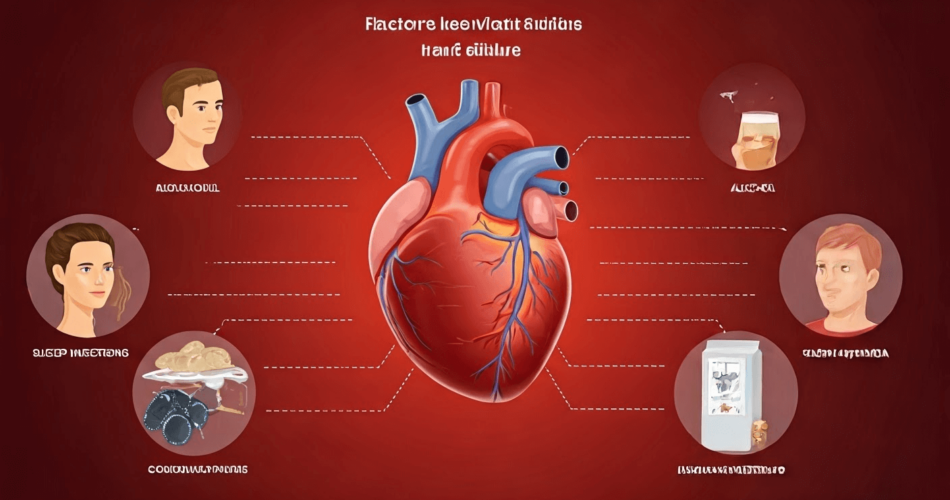Key Highlights
- Heart failure means your heart struggles to pump sufficient oxygen-rich blood.
- Ignoring risk factors like family history, viral infections, and substance abuse can have dire consequences.
- Coronary artery disease, obesity, and high blood pressure are also major contributors to heart failure.
- Recognizing early symptoms, such as shortness of breath and fatigue, is crucial.
- Lifestyle changes, medications, and in severe cases, surgery or a heart transplant may be necessary.
- Understanding the causes and symptoms of heart failure is paramount for prevention and early intervention.
Introduction
Heart failure is a serious condition that affects many people. It can come from risk factors that are often not noticed. This happens when the heart cannot pump enough blood to meet the body’s needs, impacting both sides of your heart. It can harm overall health and quality of life. This blog post looks at seven important causes of heart failure, including the common type of heart failure, that people often miss. Recognizing these causes can help with early detection and better management.
7 Critical Causes of Heart Failure You Shouldn’t Overlook
High blood pressure, heart disease, and chronic obstructive pulmonary disease (COPD) coronary artery disease often cause heart failure. Also, lifestyle choices like smoking, not exercising, and having a bad diet can make it worse. Additionally, genetic factors, congenital heart defects, and other medical conditions are important as well. Watch for symptoms like shortness of breath, an irregular heartbeat, or fluid buildup in your lower body. Don’t ignore these signs. Spotting risk factors early can help manage heart health better. Regular check-ups, blood tests, and monitoring by healthcare experts are crucial for prevention.
1. Family History
Family history is important for heart health, but many people overlook it. If you have a close family member with heart failure, you might be at a higher risk because of your genes. These hereditary factors can affect how your heart grows and works, which could raise your chances of problems. You can use genetic testing to check your risk. Still, it is very important to live a heart-healthy lifestyle to reduce any genetic risks you may have.
2. Viral Infections
Some viral infections may seem harmless, but they can be dangerous for your heart. Viruses can directly infect and inflame the heart muscle. This condition is known as myocarditis. Myocarditis can weaken the heart muscle. This weakness impacts the heart’s ability to pump blood well. Over time, this can lead to heart failure.
3. Alcohol and Drug Abuse
The effects of regular alcohol and drug use on the heart are often ignored. Drinking too much alcohol can cause a problem called cardiomyopathy. This condition makes the heart muscle weak and bigger. Drug abuse, especially cocaine, can hurt the heart directly. It can change how the heart works and can even lead to heart failure.
4. Sleep Apnea
Sleep apnea causes breaks in breathing when you sleep. It is not just a sleep problem; it can also harm your heart health. These breaks put pressure on your heart, which affects its normal rhythm and can cause an irregular heartbeat. If this keeps happening, it can weaken your heart and raise the risk of heart failure.
5. Obesity
Carrying extra weight puts extra pressure on the heart. This makes it work harder to move blood around the body. Being overweight is also connected to problems like high blood pressure and diabetes. These conditions can raise the risk of heart failure. It’s important to eat a balanced diet and exercise often. This can help manage weight and improve heart health.
6. Coronary Artery Disease
Coronary artery disease happens when plaque builds up in the blood vessels that supply blood to the heart. This buildup can block blood flow, potentially resulting in a heart attack. When blood flow is restricted, the heart has to work harder. Over time, this can weaken the heart muscle and may lead to heart failure. To lower the risk of this disease, it is important to manage cholesterol levels and live a heart-healthy lifestyle.
7. High Blood Pressure
High blood pressure makes your heart work harder to pump blood. Over time, this extra effort can strain the heart muscle. This strain may cause the heart muscle to thicken or become stiff. When this happens, it can pump less efficiently and raise the risk of heart failure. It is important to manage blood pressure with medication and lifestyle changes to keep your heart healthy.
Understanding the Impact
You might be asking how these different factors come together to affect the heart’s job. Each of these conditions, directly or indirectly, weakens the heart’s ability to pump. This makes it harder for the heart to supply the needs of the body.
How These Causes Lead to Heart Failure
Heart failure happens when the heart’s ability to pump blood weakens. This is measured by something called reduced ejection fraction and preserved ejection fraction. A lower ejection fraction means that less blood is pushed out with each heartbeat. Different factors can hurt the heart’s ability to pump. This can lead to congestive heart failure. In this condition, the heart finds it hard to meet the body’s need for blood full of oxygen.
Preventing Heart Failure: Steps to Take Today
Some risk factors for heart failure, like family history and certain health conditions, are not in our hands. However, there are risk factors we can change by improving our lifestyle and getting medical help. Even small changes in your daily habits can lower your risk of heart failure. Here are some things you can do:
- Keep a healthy weight
- Get regular exercise
- Stop smoking
- Manage stress well
- Check your blood pressure and cholesterol levels often
Recognizing the Signs of Heart Failure
Early detection of heart failure is very important for good care and treatment. However, it can be hard to spot the signs because they often appear slowly and look like symptoms of other health issues. It is crucial to know the warning signs and when to get medical help.
Symptoms Not to Ignore
Symptoms of heart failure symptoms can differ in how strong they are and how they show up. People who experience heart failure often feel ongoing shortness of breath, especially when they are active or lying down. Other symptoms of heart failure can include:
- Ongoing coughing
- Wheezing
- Tiredness
- Fast or irregular heartbeat
- Swelling in the legs, ankles, or feet (edema)
- Quick weight gain
When to Seek Medical Attention
If you have any of the symptoms listed above, it is very important to see a healthcare professional right away. This is especially true if the symptoms are new, last for a long time, or get worse. Getting an early diagnosis and treatment can greatly help with heart failure. Do not wait to get medical care, especially if you have chest pain, fainting, or serious shortness of breath. These could mean there is an emergency.
Conclusion
Heart failure is a serious condition that can have many different causes, including atrial fibrillation, a common type of irregular heart rhythm. It is important to know these factors to help prevent it and treat it early. You can lower your risk of heart failure by looking at your family history, recent viral infections, and lifestyle habits. It’s important to pay attention to warning signs and get medical help quickly to manage your heart health. Notably, studies indicate that Black and African American people are often more affected by heart failure compared to people of other races. Stay informed about your heart, keep regular check-ups, and make good lifestyle changes to protect your heart. Your heart deserves the best care. If you have any worries or questions, talk to a healthcare professional for help and advice.
Frequently Asked Questions
Can lifestyle changes reverse heart failure?
Lifestyle changes alone cannot fix heart failure. However, they can greatly help maintain heart rhythm and improve heart health, including stabilizing heart rate. These changes can slow down how fast the disease gets worse. They can also make medical treatments work better. This all leads to a better outlook for patients.
How does high blood pressure cause heart failure?
High blood pressure forces the heart to work harder. Over time, this can weaken the heart muscle. As a result, the heart becomes less effective at pumping blood. Continued pressure can finally lead to heart failure.
Can a person recover from heart failure?
There is no cure for heart failure. However, if it is diagnosed and treated early, symptoms can be managed. As part of your treatment, this may include lifestyle changes, medications, and for some severe cases, heart transplant or surgery. These steps can help improve heart function and enhance the quality of life for the rest of your life.
What are the four main causes of heart failure?
The four main reasons for heart failure are coronary artery disease, coronary heart disease, high blood pressure, alcohol abuse, and viral infections. Alcohol abuse can lead to a condition called cardiomyopathy, which affects the heart muscle. Viral infections can also cause harm to the heart.




